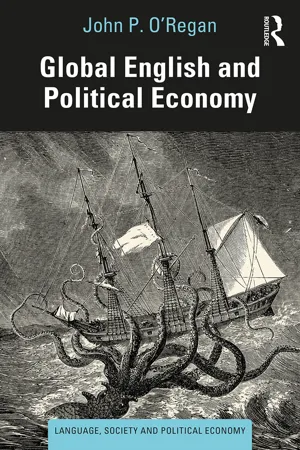
- 272 pages
- English
- ePUB (mobile friendly)
- Available on iOS & Android
Global English and Political Economy
About this book
In this book, John O'Regan examines the role of political economy in the worldwide spread of English and traces the origins and development of the dominance of English to the endless accumulation of capital in a capitalist world-system.
O'Regan combines Marxist perspectives of capital accumulation with world-systems analysis, international political economy, and studies of imperialism and empire to present a historical account of the 'free riding' of English upon the global capital networks of the capitalist world-system. Relevant disciplinary perspectives on global English are examined in this light, including superdiversity, translanguaging, translingual practice, trans-spatiality, language commodification, World Englishes and English as a Lingua Franca. Global English and Political Economy presents an original historical and interdisciplinary interpretation of the global ascent of English, while also raising important theoretical and practical questions for perspectives which suggest that the time of the traditional models of English is past.
Providing an introduction to key theoretical perspectives in political economy, this book is essential reading for advanced students and researchers in applied linguistics, World Englishes and related fields of study.
Frequently asked questions
- Essential is ideal for learners and professionals who enjoy exploring a wide range of subjects. Access the Essential Library with 800,000+ trusted titles and best-sellers across business, personal growth, and the humanities. Includes unlimited reading time and Standard Read Aloud voice.
- Complete: Perfect for advanced learners and researchers needing full, unrestricted access. Unlock 1.4M+ books across hundreds of subjects, including academic and specialized titles. The Complete Plan also includes advanced features like Premium Read Aloud and Research Assistant.
Please note we cannot support devices running on iOS 13 and Android 7 or earlier. Learn more about using the app.
Information
1 The political economy of English in a capitalist world-system
English and capital
Table of contents
- Cover
- Half Title
- Series
- Title
- Copyright
- Contents
- Acknowledgements
- 1 The political economy of English in a capitalist world-system
- 2 English and the political economy of informal empire, 1688–1850
- 3 The political economy of global English, 1850–1914
- 4 The political economy of global English, 1918–1979
- 5 Capital-centric English and the modern world-system, 1979–2008
- 6 The decline of the US world-hegemony
- 7 Superdiverse translingualism, commodification and trans-spatial resistances
- 8 The demise of capitalism and the end of the hegemony of English
- References
- Index